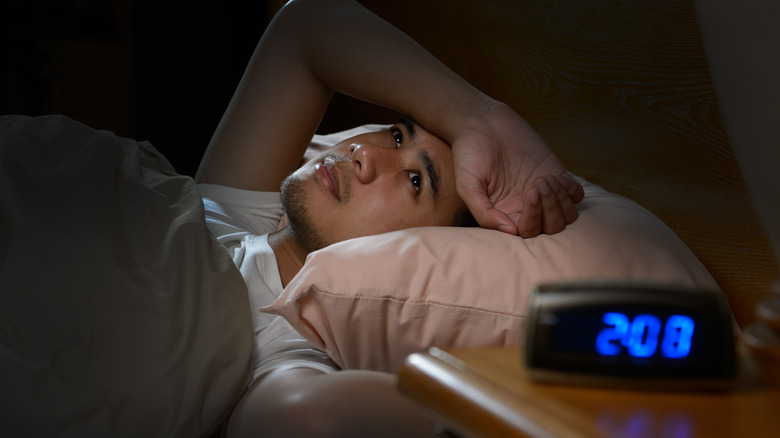Is Insomnia Genetic?
Insomnia is a disorder that affects every facet of sleep including sleep latency, duration, and overall quality of sleep, reports the National Heart, Lung, and Blood Institute. For this reason, the condition can hinder one's ability to function during the daytime. People with insomnia often struggle to fall asleep, wake up during the course of the night, and may feel tired the next day. For those who experience ongoing insomnia that cannot be linked to an alternate health condition, these symptoms occur at least three nights a week for a stretch of three months or more.
Researchers from a 2017 study point out how insomnia develops from psychiatric traits. This includes mental health conditions, like depression or anxiety (via Science Daily). While this can be one cause of the disorder, research has shown that it may not be the only cause (per National Heart, Lung, and Blood Institute). In addition to stress and one's environment, it turns out that our genes may also play a supporting role in whether or not we develop chronic insomnia.
How the influence of genes may change over time
The 2017 study published in Nature Genetics involved more than 113,000 participants, in which researchers identified seven genes that may predispose people to the development of insomnia. Interestingly, one of the seven genes has also been found in connection with two alternate sleep disorders (via Science Daily). Lending further evidence to these findings was a 2018 study published in Molecular Psychiatry. Researchers analyzed DNA samples from over 33,000 army service members and determined that several of the insomnia-related gene variants identified were located in regions responsible for the body's natural sleep-wake cycle (per Science Daily).
Furthermore, a 2015 longitudinal study published in the scientific journal Sleep found that genes may play a moderately strong role in the development of insomnia in kids and adolescents. In an analysis of 1,412 pairs of twin siblings ages eight through 18, researchers determined that the influence of genes on insomnia prevalence rates in youth seemed to change as they grew older. On average, between the ages of eight and 10, genetics accounted for 33-38% of insomnia cases. Around the ages of 14 and 15, genetics influenced 14-24% of insomnia ratings. As a result, the researchers concluded that insomnia is somewhat hereditary and different treatment options for it may be warranted depending on age.


